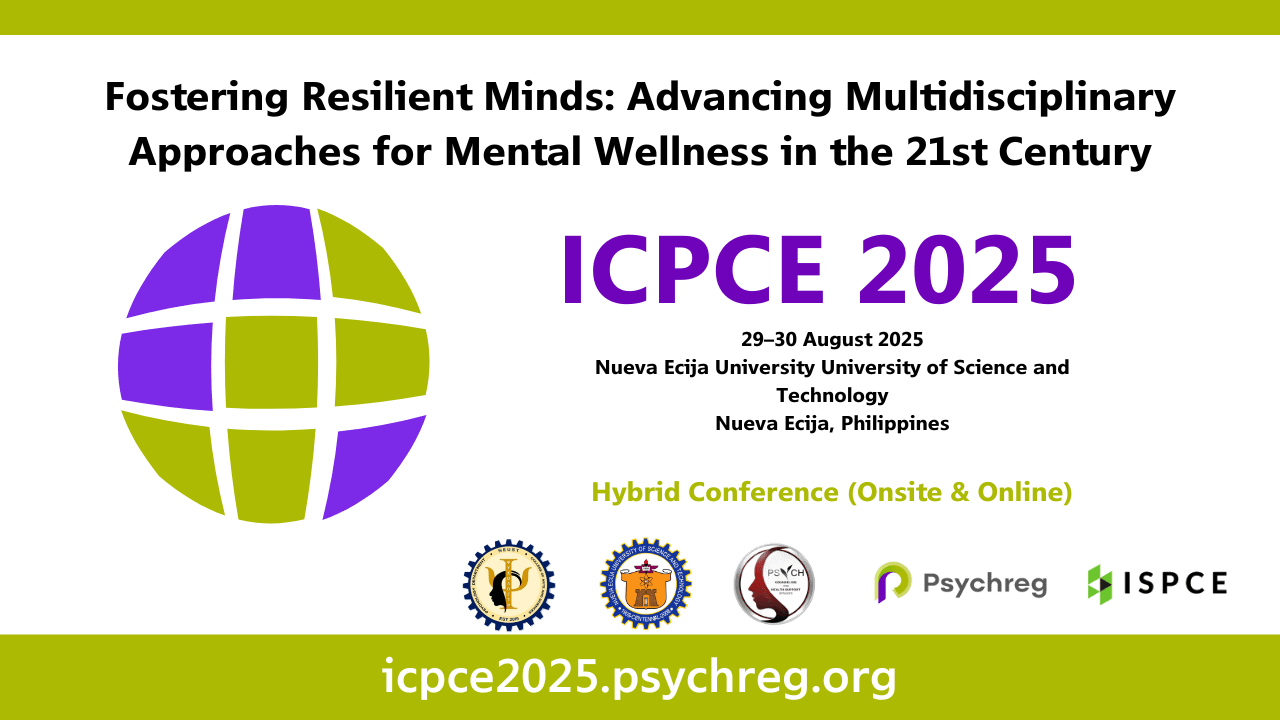Preparations are well underway for the 7th International Conference on Psychology, Counselling, and Education (ICPCE 2025), which will take place on Friday 29th and Saturday 30th August at the Nueva Ecija University of Science and Technology (NEUST) in the Philippines. The hybrid format of this year’s event will welcome both onsite and online participants from across the globe.
With the theme Fostering Resilient Minds: Advancing Multidisciplinary Approaches for Mental Wellness in the 21st Century, ICPCE 2025 will bring together scholars, practitioners, and professionals from diverse fields including psychology, counselling, education, public health, sociology, allied health professions, sports science, and more. The conference will serve as an inclusive platform for the exchange of ideas, empirical evidence, and practical applications to support mental wellness in a rapidly changing world.
General guidance
- Full details, including the conference programme and timetable for the parallel sessions, are available on the official conference website.
- Please arrive at least one hour before the start time for onsite registration.
- Registration fees are non-refundable.
- All paid participants, whether onsite or online, will receive a certificate of participation.
- All times listed are in Philippine time. For convenience, use online tools such as 24timezones to convert to your local time.
Zoom access for online participants
- A single Zoom link will be provided for the main event.
- Separate Zoom links will be used for parallel sessions. These will be emailed to you before the conference.
- Please sign in using your full name. Unregistered participants will be removed from the Zoom rooms.
- For paper presenters
Online participants: joining your session
- Join your assigned Zoom room or be ready onsite ten minutes before your scheduled time.
- The session chair will make you a co-host if you are presenting online so you can share your screen.
Time management
- Each paper presentation is fifteen minutes, with ten minutes for your presentation and five minutes for questions and answers.
- Limit yourself to one slide per minute of presentation time.
- Avoid overcrowded slides. Keep content concise and easy to read.
Presentation structure
- Follow the logical format of a research paper: research problem, related studies, method, results, conclusion, and implications.
- Use a consistent, professional font such as Arial, Times New Roman, or Century Gothic.
- Keep your slides clear and professional. Avoid excessive animation or distracting effects.
Content tips
- Limit each slide to one to three main points.
- Incorporate images, diagrams, or short videos to clarify complex ideas.
- Avoid long tables unless key information is highlighted for clarity.
References
- If including references, integrate them within relevant slides rather than placing them all on a separate slide at the end.
- You may provide a QR code for your full reference list.
Contact information
- End your presentation with your email address so participants can reach out with questions.
How to answer questions about your research
- Some questions may be intended to challenge your work rather than to clarify or learn. Address them professionally and confidently.
- If you do not know the answer, it is fine to say so.
- Treat your presentation as an opportunity to share your research, not as a competition. Be proud of your work.
A few more tips
- Avoid overcomplicating your presentation. Clarity is more effective than trying to impress with complex language.
- Use accessible and precise language instead of jargon.
- Remember that the goal is to share your research and engage with others. Be natural, confident, and enjoy the experience.
We look forward to welcoming you to ICPCE 2025, whether you will be joining us onsite at NEUST or online from anywhere in the world.
Full paper submission
The deadline for the submission of full papers is Friday 5th December 2025. Accepted full papers will be published in the ISPCE Bulletin. Inclusion in the publication is reserved for authors who paid the conference registration fee. This ensures the quality, integrity, and sustainability of the conference’s scholarly output while recognising the contributions of participants who have formally committed to the event.







